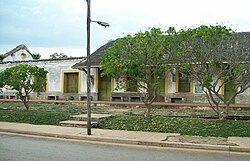Pedro Betancourt
| Pedro Betancourt | ||
|---|---|---|
| Municipality | ||

Railway station
|
||
|
||
 Pedro Betancourt municipality (red) within Matanzas Province (yellow) and Cuba |
||
| Location of Pedro Betancourt in Cuba | ||
| Coordinates: 22°43′49″N 81°17′27″W / 22.73028°N 81.29083°WCoordinates: 22°43′49″N 81°17′27″W / 22.73028°N 81.29083°W | ||
| Country |
|
|
| Province | Matanzas | |
| Founded | 1833 | |
| Established | 1879 | |
| Area | ||
| • Total | 388 km2 (150 sq mi) | |
| Elevation | 25 m (82 ft) | |
| • Density | 83.0/km2 (215/sq mi) | |
| Time zone | EST (UTC-5) | |
| Area code(s) | +53-52 | |
Pedro Betancourt, sometimes shortened as Betancourt, is a municipality and town in the Matanzas Province of Cuba. It is located in the center of the province, west of Jagüey Grande and east of Unión de Reyes. It was founded in 1833.
Its original name was Corral Falso de Macurijes. Pedro Betancourt's name comes from a famous Spanish-Cuban patriot, Pedro Estanislao Betancourt Dávalos, who was one of the Major-General in the independence war, waged by the Cuban natives against the Spanish Crown.
The municipality was historically divided into the barrios of Cabecera Norte, Cabecera Sur (both constituting the town), Ciego, Linche, Navajas, Platanal, Punta Brava, Torriente and Tramojos. Nowadays it counts the town itself and 6 popular councils (consejos populares, i.e. villages): Bolondrón, Camilo, Güira de Macurijes, Manolito, Navajas and Pedroso-Socorro.
In 2004, the municipality of Pedro Betancourt had a population of . With a total area of 388 km2 (150 sq mi), it has a population density of 83.0/km2 (215/sq mi).
...
Wikipedia


